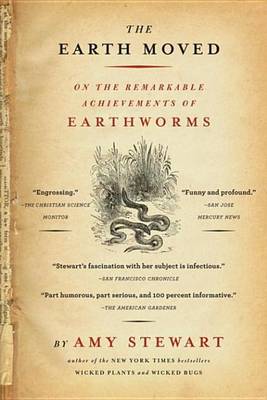
The august Charles Darwin devoted the last years of his life to the meticulous study of one animal: the earthworm. It may be small, spineless and blind, but its role in the ecosystem is profound. It tills the soil, destroys microscopic organisms that cause plant disease, breaks down toxins and turns the ground into rich compost, creating the most fertile areas on earth. In a witty and offbeat encomium to this humble creature, Amy Stewart weaves her own back garden investigations with those of the eccentric oligochaetologists who have made the close study of worms their personal obsession. From the legendary giant Australian worm that burrows up to fifteen feet below the ground to the modest nightcrawler that inspired Darwin to write his last book and Amy Stewart's own collection of red wrigglers, The Earth Moves finally gives worms their due and exposes the hidden and extraordinary universe below our feet.
Yep. Earthworms. Unsung heroes.
Amy Stewart has become one of the few authors I'd wait in line for a signature for - have I mentioned that before? She makes a great spokesperson for these unfairly maligned little earth movers. In a chatty but informative style she covers the earthworms' role in history, agriculture, backyard gardening, forestry and even sewage treatment and soil reclamation.
Did you know that Australia has an earthworm that grows over 3 feet long, and when it moves around under the earth, farmers can hear a gurgling sound? They're native to a farming area called Gippsland, here in Victoria, so of course I want to go and stand in the middle of a pasture like an idiot in hopes of hearing them gurgle along beneath me, while trying not to think of the movie Tremors.
There's no denying this is not a book for everyone. But gardeners, environmentalists, and armchair scientists will all find something interesting and fascinating here.
Reading updates
-
Started reading
-
17 February, 2017:
Finished reading
-
17 February, 2017:
Reviewed
